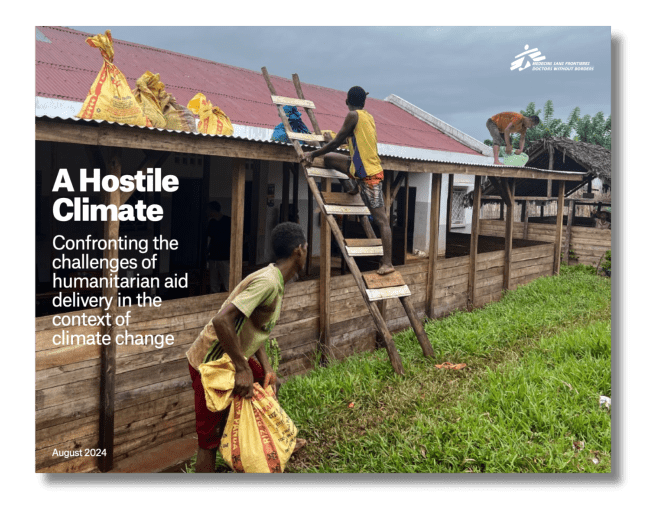Climate change is harming people’s health around the world, while making humanitarian responses more challenging. A new report from Doctors Without Borders/Médecins Sans Frontières (MSF) describes how MSF humanitarian workers, patients, and communities are experiencing and responding to a rapidly changing environment.
Conducted in partnership between MSF’s Humanitarian Action for Climate and Environment (HACE) Initiative and Heidelberg University Institute of Global Health, the report, A hostile climate: Confronting the challenges of aid delivery in the context of climate change, draws on interviews with 49 humanitarian staff in 30 countries and details how climate hazards, changes in water availability and quality, and food scarcity linked to climate change are amplifying humanitarian needs.
The health impacts of climate change include injury and death; heat-induced illness; changing patterns of respiratory, waterborne, and vector-borne disease; malnutrition; and mental health issues. Climate change also comes with social impacts, causing the loss of livelihoods, driving migration, and even sparking violence and conflict.


From left: Weather events can cause poor road conditions that impede access to care in Madagascar. 2024 © MSF; an MSF emergency response team travels by boat to reach a village cut off by floodwater in Pakistan. 2022 © Zahra Shoukat/MSF
The effects of climate change are disproportionately felt by certain groups, such as children, women, disabled and older people, Indigenous people, and displaced people. Communities that are the least responsible for the greenhouse gas emissions that have caused the climate crisis are also typically the least able to cope and adapt.
Climate change and environmental degradation are also making providing humanitarian assistance more difficult in two ways: by amplifying humanitarian need, and by further complicating humanitarian interventions. Damage to infrastructure, disruptions to transport and supply chains, and increasingly harsh working conditions all make the task of humanitarian response more challenging. Moral distress—negative emotions experienced by health care providers and humanitarian workers in situations where they feel they cannot follow the “right" course of action—also presents obstacles to effective aid delivery.
In the face of these challenges, MSF teams are beginning to adapt to the realities of climate change alongside communities where we work. The humanitarian staff interviewed in the report describe efforts including raising awareness, anticipating what will be needed for people to adapt to their changing climates, and fostering collaboration.
“I think we’ve got the opportunity to refine our way of working,” said an MSF humanitarian worker in Switzerland. For example, teams in Madagascar have been boosting emergency preparedness and surveillance by covering climate-related factors like rainfall and crop yields, “rather than waiting for kids with severe acute malnutrition to start turning up.”
Key findings
- MSF staff report devastating impacts of climate change and environmental degradation on themselves, their families, and their communities, as well as MSF’s ability to operate. Climate change exacerbates threats to health and makes humanitarian operations more logistically challenging and personally risky for staff.
- Despite the enormity of the health impacts of climate change and environmental degradation, there is still low capacity to cope and respond to these impacts within MSF and in the communities where we work. This reflects the global ‘adaptation gap,’ in which efforts to adapt to the consequences of climate change by governments, health systems, and non-governmental and multilateral organizations are falling short.
- The identification of this ‘adaptation gap’ opens up opportunities for accelerating adaptive actions. Such actions proposed by MSF staff include: raising awareness of adaptation and adaptive strategies; further integrating an anticipatory mindset into operations; considering resilience-building measures in humanitarian assistance; and fostering collaborations that boost adaptation.
The research finds that adaptive measures remain quite limited in scale and scope within MSF and in communities—especially considering the current and expected impacts of climate change. A scale-up of efforts to adapt represents a significant opportunity to strengthen humanitarian response and safeguard people’s health.
“Many communities and organizations remain vulnerable to the escalating risks presented by climate change, because the response does not measure up to the needs,” said Léo Lysandre Tremblay, lead of MSF’s HACE initiative and a co-author of the report. “This underscores the importance of more ambitious action to reduce risk, increase preparedness, and protect people and communities from the impacts of climate change. This report, which describes adaptation efforts employed, observed, and envisioned by MSF teams, may offer ideas and inspiration to this end.”
The research was conducted with the aim to better understand how MSF humanitarian workers, patients, and communities are experiencing and responding to climate change, and to strategically adapt MSF’s operations to meet the challenges of the moment. MSF is sharing its findings to assist other organizations in reflecting on the health impacts of climate change on their operations, and to identify strategies and actions to minimize the impacts of climate-related health threats.
Involving communities in solutions and ensuring proper financial support is key in building resilience and adapting to the consequences of climate change.

A hostile climate
Confronting the challenges of humanitarian aid delivery in the context of climate change




